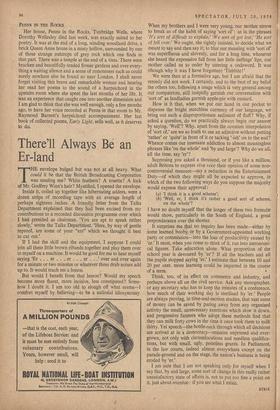There'll Always Be an
THE envelope bulged but was not at all heavy. What could it be that the British Broadcasting Corporation was sending me? White feathers? A rosette? A lock of Mr. Godfrey Winn's hair? Mystified, I opened the envelope.
Inside it, coiled up together like hibernating adders, were a dozen strips of recording tape with an average length of perhaps eighteen inches. A friendly letter from the Talks Department explained that they had been excised from my contributions to a recorded discussion programme over which I had presided as chairman. 'You are apt to speak rather slowly,' wrote the Talks Department. 'Here, by way of gentle reproof, are some of your "ers" which we thought it best to cut out.'
If I had the skill and the equipment. I suppose I could join all these little brown ribands together and play them over to myself on a machine. It would be good for me to hear myself saying 'Er . . . er . . . er . . . er . . .' over and over again for a minute or two minutes or whatever these drab noises add up to. It would teach me a lesson.
But would I benefit from that lesson? Would my speech become more fluent, more incisive, less constipated? Some- how I doubt it. I am too old to slough off what seems—I comfort myself by believing—to be a national idiosyncrasy. When my brothers and I were very young, our mother strove to break us of the habit of saying 'sort of' : as in the phrases 'It's sort of difficult to explain,' We sort of got lost,' He sort of fell over.' We ought, she rightly insisted, to decide what we meant to say and then say it; to blur our meaning with 'sort of' was superfluous and -slovenly, and for a long time, whenever she heard the expression fall from her little darlings' lips, our mother called us to order by uttering a codeword. It was (though why it was I have forgotten) 'Tishbite!'
We were then at a formative age, but I am afraid that the remedy did not work. I certainly, and to the best of my belief the others too, following a usage which is very general among our compatriots, still insipidly garnish our conversation with 'sort of' as landladies garnish apple-pie with custard.
How is it that, when we put our hand in our pocket to dispense the bright matchless currency of our language, we bring out such a disproportionate sediment of fluff? Why, if asked a question, do we practically always begin our answer by saying, 'Well'? Why, apart from the constant interpolation of 'sort of,' are we so loath to use an adjective without putting 'rather' or 'quite' in front of it or tacking '-ish' on to the end? Whence comes our insensate addiction to almost meaningless phrases like 'on the whole' and `by and large'? Why do we all, all the time, say 'er'?
Supposing you asked a thousand, or if you like a million, adult Britons to express viva voce their opinion of some non- controversial measure—say a reduction in the Entertainment Duty—of which they might all be expected to approve, in which of the two following ways do you suppose the majority would express their approval :
(a) 'I think it is a good scheme'; (b) 'Well, er, I think it's rather a good sort of scheme, on the whole'?
I have no doubt myself that the longer of these two formulx would show, particularly in the South of England, a great preponderance over the shorter.
It surprises me that no inquiry has been made—either by some learned booby or by a Government-appointed working party or commission—into the loss of productivity caused by 'er.' It must, when you come to think of it, run into astronomi- cal figures. Take education alone. What proportion of the school year is devoured by 'er'? If all the teachers and all the pupils stopped saying 'er,' I estimate that between 10 and 20 per cent. more learning could be imparted in the course of a term. 6 Think, too, of its effect on commerce and industry, and perhaps above all on the civil service. Ask any stenographer, or any secretary who has to keep the minutes of a conference, how much of their working day is sterilised by 'er.' People are always proving, in time-and-motion studies, that vast sums of money can be saved by paring away from any organised activity the small, unnecessary exertions which slow it down, and progressive farmers who adopt these methods find that they can milk forty cows in the time it once took them to milk thirty. Yet speech—the bottle-neck through which all decisions are arrived at in a democracy—remains unpruned and over- grown, not only with circumlocutions and needless qualifica- tions, but with small, ugly, pointless grunts. In Parliament, in the law courts, indeed almost everywhere except on the parade-ground and on the stage, the nation's business is being eroded by 'er.'
I am sure that I am not speaking only for myself when I say that, by and large, some sort of change in this really rather unsatisfactory state of affairs is, not to put too fine a point on it, just about overdue : if you sec what 1 mean.


















































 Previous page
Previous page